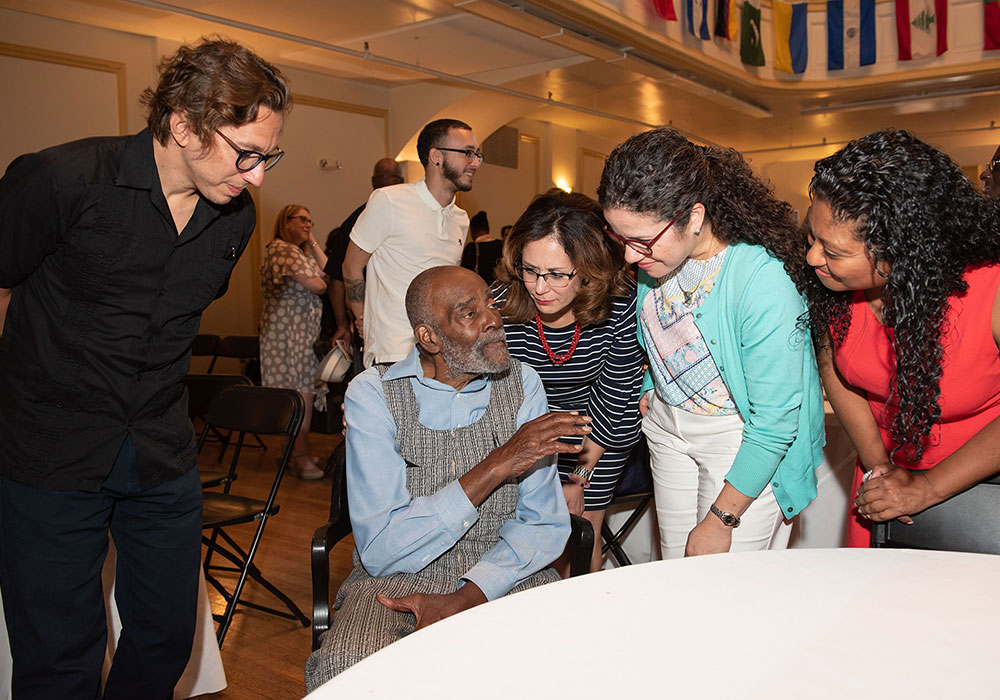Continuing Mel King's Legacy, Fighting Racism and Economic Inequality

Mel King is a highly accomplished public figure. He can also rock a pair of overalls. Even today at over 90 years old, passersby frequently recognize and greet him on the street in his identifiable outfit. For decades, he has invited anyone who wanted to come to his home for a communal Sunday breakfast.
Beyond his popularity, Mr. King has worked as a teacher, community activist, nonprofit founder, elected politician, author, and MIT adjunct professor among many other roles.
Mel King: Boston Activist, Politician, Educator
Born and raised in Boston, his career path was often difficult and without precedent. In the 1950s, his diverse working-class neighborhood was torn down during urban renewal. He saw firsthand how many residents were left to fend for themselves, without any support for housing, job opportunities, or education.
Mr. King rose to recognition in the public sphere starting in 1968, when he helped organize sit-ins at the Boston Redevelopment Authority (BRA) office in protest of a planned parking garage in the South End neighborhood. Protestors faced police retaliation, building tents and wooden shanties for their newly created "Tent City". These protests eventually led to the christening of the current Tent City Apartments complex in the South End.
Beyond political organizing, Mel King served as State Representative for the 9th Suffolk District, and he ran for Boston mayor in 1983, the first African-American to run in a final election bid for mayor of Boston. Although he ultimately lost in that race, Mr. King paved the way for future aspiring Black politicians, as evidenced by current interim Mayor Kim Janey.
After working as a politician, Mel King turned to writing and teaching to share the knowledge gained throughout his career. Mr. King's seminal book, Chain of Change, is both a history of Black community development and a strategic proposal for future economic development and political representation for the Black community. Not to be stopped by retirement, he founded the South End Technology Center, to empower young people through technology and leadership development. Mel King has had a wide-ranging and influential career fighting systemic racism and economic inequity.

Mel King (seated) speaking with a group of individuals.

Chain of Change, Mel King's book offers a historical perspective and a strategic future for the Black community.
Continuing Mel King's Legacy Through Education
In 2009, the Massachusetts Association of Community Development Corporations (MACDC) and Local Initiatives Support Corporation (LISC) partnered to create the Mel King Institute for Community Building. MACDC and LISC saw a need for continuing professional development within the community development field, guided by the same causes that Mr. King has spent his whole life fighting for. I feel privileged to work for the Institute as part of a two-year fellowship.
We strive to continue his legacy of education and community development through professional education, leadership development, field building, and racial equity work. Our six learning areas focus on a wide range of topics relevant to holistically solving community development problems:
- Racial Equity
- Nonprofit Governance
- Community Organizing and Planning
- Real Estate Development
- Economic Development
- Leadership Development
We pride ourselves on our high-quality training and workshops, as well as our role as an information clearinghouse for community development practitioners. Our work causes a cascading effect, where the knowledge, skills, and shared best practices around community development topics flow from the individual level to organizations, and from there to field-wide improvement and proliferation.

Orientation at the Mel King Institute.
Boston History Workshops Inspire Activism Legacy
Recently, we held a three-part workshop series called People, Power, and Place: A History of Organizing and Movement Building. This series focused on three historical Boston events and the extraordinary community organizing movements that changed the physical and cultural landscape of Boston. Each day focused on a different event: the movement to stop the I-95 Highway, the Boston Tenants Rights activism and formation of the Community Reinvestment Coalition, and finally the Great Recession era foreclosure crisis. All three workshops featured current resident leaders and organizers or community organizations actively engaged in the continuing work of keeping people in their homes and stabilizing neighborhoods. These influential community organizing movements show the power of engaged citizens to positively impact their neighborhoods and cities, something that Mr. King believed in.
The Mel King Institute has grown in recognition and influence over the past 12 years, but we maintain strong connections across the local community development network. Pre-pandemic, staff members would attend his Sunday breakfasts, and Mr. King would attend our annual celebrations. Even now, as Mel is over 90 years old, we at the Institute are contacted regularly by past students, acquaintances, and reporters asking to speak to Mel. I am proud to be fighting for the causes he has championed all his life through the community development work that we accomplish at the Mel King Institute.
Top Image: Photographed by Douglas M. Brugge



